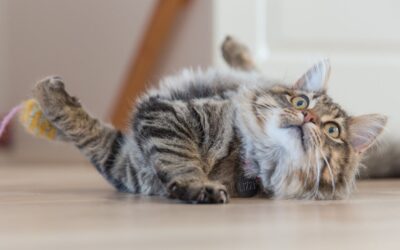What essential oils are safe for cats?
Essential oils are becoming more popular in households worldwide, offering many benefits ranging from relaxation to natural cleaning solutions. But if you’re a cat owner, it’s crucial to know which oils are safe and how to use them responsibly.
Understanding the implications of essential oil use around cats can prevent harmful side effects and ensure the well-being of your feline friends.

Why Essential Oil Safety Matters for Cats
Cats are more sensitive to essential oils than humans or even dogs. Their unique liver enzymes can’t break down certain compounds found in many essential oils. This sensitivity makes them more susceptible to essential oil toxicity, which can lead to severe health issues.

Understanding Essential Oils and Their Uses
Essential oils are extracted from plants and used for various purposes, including aromatherapy, skincare, and household cleaning. Each oil has its unique properties and benefits, but not all are safe for cats. Whether you’re using oils for their calming properties or as a flea repellent, it’s essential to choose pet-safe essential oils.
The Risks of Using Essential Oils Around Cats
While essential oils have many benefits, they can pose significant risks to cats. Some oils are toxic and can cause symptoms ranging from skin irritation to liver failure. Understanding these risks can help you take the necessary precautions to protect your pets.
Essential Oils Toxic to Cats
Many essential oils are toxic to cats, including the most dangerous essential oil being tea tree oil, peppermint oil, eucalyptus oil, and citrus oils. These oils can cause severe reactions, including difficulty breathing, digestive issues, and even liver failure. Always exercise caution when using these oils around your feline friends.
Symptoms of Essential Oil Poisoning
If your cat is exposed to toxic essential oils, you’ll want to watch for symptoms like drooling, vomiting, difficulty breathing, or lethargy. Immediate veterinary care is crucial to prevent severe health complications. Early detection of essential oil poisoning can make a significant difference in treatment outcomes.
Safe Essential Oils for Cats
Not all essential oils are harmful to cats. Some oils are generally safe when used correctly. These oils can provide various health benefits, including reducing inflammation and promoting a calming effect.

Top Cat Safe Essential Oils
When it comes to using essential oils around your feline friends, certain oils have been identified as generally safe and beneficial. Below is a list of some of the top essential oils that you can consider incorporating into your cat care routine, along with links to the products for easy access.
Catnip Oil
Catnip oil is known for its playful and stimulating effects on cats. This oil can encourage playful behavior and can help alleviate stress during anxious situations. It’s often used to create a comforting environment that engages your cat’s natural instincts.
Rosemary Essential Oil
Rosemary essential oil is celebrated for its invigorating scent and potential benefits for both mental clarity and skin health.
It can aid in improving circulation and has natural antiseptic properties, making it a good option for promoting a healthy coat and skin. Additionally, its uplifting aroma may help alleviate feelings of anxiety in some cats.
Purchase and About Rosemary Essential Oil
Cedarwood Oil
Cedarwood oil possesses natural flea-repellent properties, helping to keep pests away without the use of harsh chemicals.
Frankincense Oil
Frankincense is celebrated for its anti-inflammatory properties, making it a great choice for promoting overall skin health in cats.
Coconut Oil
While not an essential oil in the traditional sense, coconut oil can be used safely for topical applications and helps to improve skin health and coat condition.
It’s essential to remember that while these oils are generally considered safe, they should always be used with caution and in accordance with best practices. Always consult your veterinarian before starting any new regimen involving essential oils.

Are Lavender and Chamomile Essential Oils Safe For Your Kitty?
While lavender and chamomile oils are often praised for their calming effects on humans and are commonly recommended in aromatherapy, caution is warranted when it comes to their use around cats. Despite their aromatic benefits, both oils can pose potential risks to feline health.
Lavender oil contains compounds that may be harmful if ingested or absorbed through the skin, leading to symptoms such as gastrointestinal upset or respiratory issues in sensitive cats.
Similarly, chamomile, especially in concentrated forms, has been known to cause allergic reactions, potentially resulting in skin irritations or more severe health issues. Given the unique physiology of cats, it’s advisable to err on the side of caution and avoid using these oils altogether.
Always consult with a veterinarian for safer alternatives before introducing any essential oil into your cat’s environment.
How to Use Essential Oils Safely Around Cats
Using essential oils safely around cats involves more than just knowing which oils are safe. Proper application and dilution are crucial to ensuring your pet’s safety. Follow these best practices to minimize risks and maximize benefits.
Dilution and Application
Always dilute essential oils before using them around your cat. Undiluted essential oils can cause skin irritation and other adverse effects. A diluted oil is much safer and can be applied to your cat’s bedding or used in a diffuser at low concentrations.
Diffusing Essential Oils
When diffusing essential oils, ensure the area is well-ventilated and that your cat can leave the room if they choose. Diffusing essential oils can benefit you and your pet, but it’s essential to monitor your cat for any signs of discomfort.
Topical Application
Topical application of essential oils should be done with caution. Only use oils that are safe for cats and always dilute them with a carrier oil like coconut oil or almond oil. Avoid applying oils directly to your cat’s skin, as they may ingest them through grooming.

Common Misconceptions About Essential Oils and Cats
Many pet parents believe that all essential oils are harmful to cats, but this isn’t entirely true. While some oils are toxic, others can be used safely with proper precautions. Understanding the nuances can help you make informed decisions about essential oil use in your home.
Myth 1: All Essential Oils Are Toxic to Cats
Not all essential oils are toxic to cats. Oils like pure lavender oil and German chamomile can be safe when used correctly. The key is to choose pet-safe essential oils and follow best practices for dilution and application.
Myth 2: Essential Oils Are Always Harmful
Essential oils can offer many benefits, including reducing anxiety and promoting skin health. When used responsibly, they can enhance your cat’s well-being. Always consult your veterinarian before introducing new oils into your routine.
Myth 3: Essential Oils Are Safe in Any Form
The form in which you use essential oils matters. Undiluted and concentrated oils are more likely to cause adverse effects. Always dilute oils and use them in a way that minimizes exposure risk.
Benefits of Using Pet-Safe Essential Oils
When used correctly, essential oils can offer many benefits for your cat’s health and well-being. From reducing stress to improving skin conditions, pet-safe essential oils can be a valuable addition to your pet care routine.
Reducing Stress and Anxiety
Certain essential oils like lavender and chamomile have calming properties that can help reduce stress and anxiety in cats. These oils can be especially beneficial during stressful times, such as moving or during fireworks.
Improving Skin Health
Essential oils with anti-inflammatory properties can help improve your cat’s skin health. Oils like coconut oil and almond oil can be used to treat minor skin irritations and promote a healthy coat.
Natural Flea Repellent
Some essential oils can act as natural flea repellents. Oils like cedarwood and lemongrass can help keep pests at bay without the harsh chemicals found in traditional flea treatments.
How to Introduce Essential Oils to Your Cat
Introducing essential oils to your cat requires careful planning and observation. Start with small amounts and monitor your cat’s reaction. Gradual introduction can help your cat adjust to new scents and reduce the risk of adverse effects.
Start Slowly
Begin by introducing one essential oil at a time. Use a small amount and observe your cat for any signs of discomfort or adverse reactions. If your cat seems fine, gradually increase the amount while continuing to monitor their response.
Monitor Reactions
Keep a close eye on your cat’s behavior and health after introducing a new essential oil. Look for signs of skin irritation, respiratory issues, or changes in behavior. Immediate discontinuation and veterinary consultation are necessary if any adverse reactions occur.
Consult Your Veterinarian
Always consult your veterinarian before introducing essential oils to your cat. They can provide guidance on which oils are safe and how to use them responsibly. Your vet can also offer treatment options if your cat experiences any adverse effects.

Tips for Buying Essential Oils
When buying essential oils, quality matters. Choose pure essential oils without additives or artificial ingredients. High-quality oils are less likely to cause adverse reactions and offer better therapeutic benefits.
Look for Pure Essential Oils
Purchase oils labeled as 100% pure essential oils. These oils are free from additives and synthetic ingredients, making them safer for use around pets. Pure essential oils offer better quality and more consistent results.
Check for Certifications
Look for certifications like USDA Organic or GC/MS testing. These certifications ensure the oils meet specific quality standards and are safe for use. Certified oils are more reliable and offer better peace of mind.
Read Reviews
Read reviews and do your research before buying essential oils. Customer feedback can provide valuable insights into the oil’s quality and efficacy. Choose brands with positive reviews and a reputation for quality.

Run out of your pet-safe essential oil that you get from the pet store? Contact Kate’s K9 Pet Care and we will deliver it straight to your door!
Conclusion | What Essential Oils Are Safe For Cats?
Understanding what essential oils are safe for cats is crucial for pet owners who want to enjoy the benefits of aromatherapy without compromising their cat’s health. By following best practices and consulting with your veterinarian, you can safely introduce essential oils into your home. Remember, your cat’s well-being is paramount, so always exercise caution and make informed decisions.
For more information on safe essential oils and expert advice, sign up for our newsletter or book a consultation with one of our specialists today








